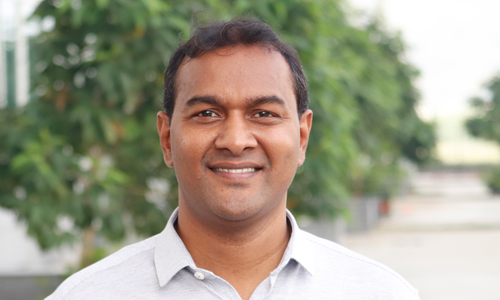 SRM University-AP is pleased to announce that Dr Anil K. Suresh, Associate Professor in the Department of Biological Sciences, has been awarded a DBT grant for his project entitled “Pilot-scale ultra-efficient fixative sewage dye-degradation by our ‘3D-megacatalyst’ generated using intact eggshell waste”.
SRM University-AP is pleased to announce that Dr Anil K. Suresh, Associate Professor in the Department of Biological Sciences, has been awarded a DBT grant for his project entitled “Pilot-scale ultra-efficient fixative sewage dye-degradation by our ‘3D-megacatalyst’ generated using intact eggshell waste”.
About the Project:
Catalysis is widely used in various industrial and pharmaceutical processes to fasters the production of the desired end products. The use of inert matrices or frameworks is emerging as a “supported catalysts” arena with the potential for efficient reuse and recovery of the catalyst. We have recently generated a wide area supported catalyst utilising intact eggshell bio-waste, and the process is autogenic, facile, cost-efficient and entirely biodegradable. This supported megacatalyst can be effortlessly removed from the reaction by hand.
The current DBT-funding through Accelerated Translational Grant for Commercialization (ATGC) program is to support the technological reediness of our project for its commercialisation as a measure of Technology Readiness Level (TRL), an estimation technologies maturity and readiness for its utilisation in the commercial market. By demonstrating proof-of-concept laboratory studies, we are currently at TRL-6, and through this project, we will demonstrate pilot-scale studies for reaching the TRL-9 (Market/Operational level).
The main objectives of the proposal are:
1. Demonstrating large-volume degradations of sewage dyes at 500 L to 1000 Litres volume capacities in custom-built batch reactors.
2. Gram-scale hydrogenation of nitroarenes for the production of ~500 grams of pharmaceutical derivatives.
Social Implications of the project by Dr Anil K. Suresh:
Thousands of litres of harmful textile, paper sewage dyes that are corrosive and toxic to the environment and are unintendedly released can now be degraded into detoxified colourless by-products and water by using our “Au@megacatalyst”.
Pharmaceutically important precursors such as 4-aminophenol, propargyl amines can be produced in milligrams of quantities by using “Au@megacatalyst”, which otherwise are expensive and hard to synthesise. And most importantly, such precursors are currently being procured from China and other countries that can be avoided, and indigenous make-in-India can be conceptualised using our catalyst.
Dr Anil K. Suresh would be the principal investigator of this project, with a total outlay of Rs. 31 lacs over two years.

